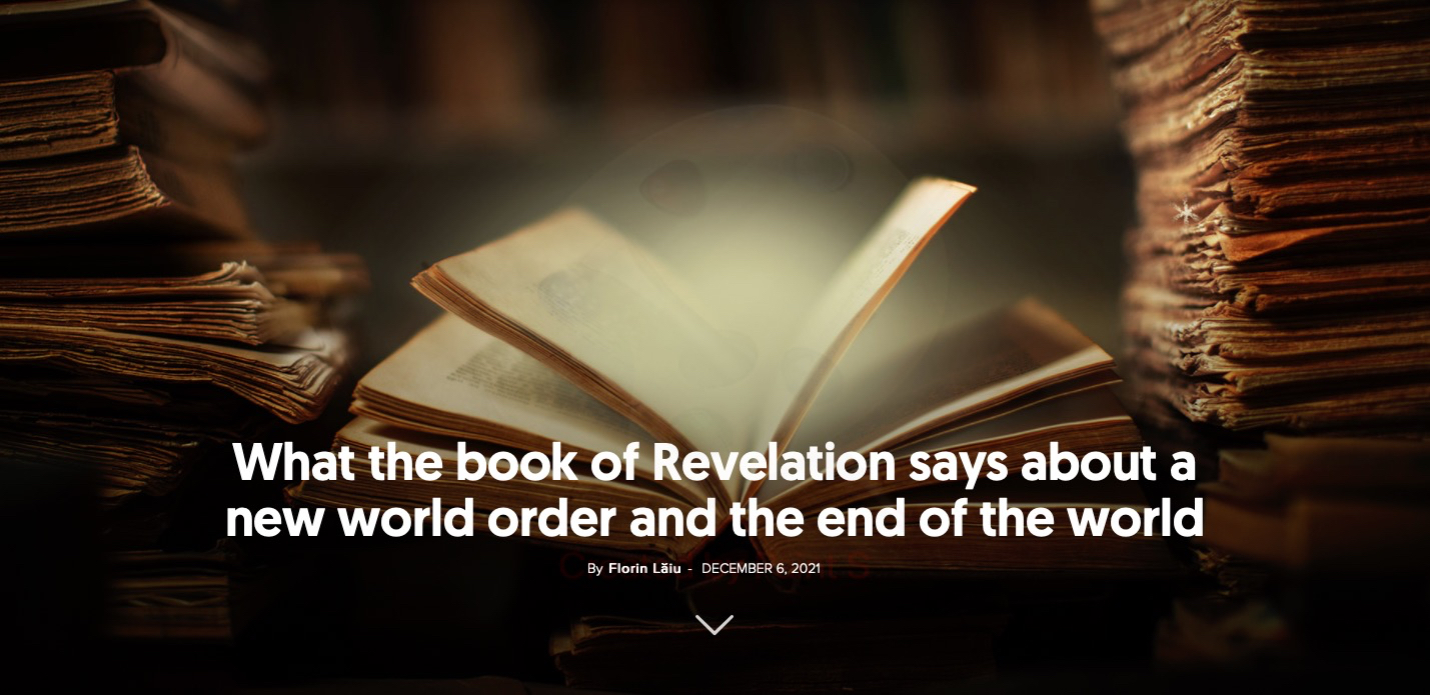If we were to make an assessment of today’s Christianity, which kind of sacrifice would we notice more frequently—the kind offered by Cain or by Abel? Cain offered a sacrifice from the fruits of the earth, and Abel from the sheep of his flock. While Abel’s sacrifice was pleasing to God, Cain’s sacrifice was rejected. From the very beginning, God has expressed His will regarding the way He wants to relate to people.
The history of the two brothers is horrendous. Adam and Eve were created by God Himself, but Cain and Abel were born of Eve. Abel’s life ended prematurely—the crime committed by his brother was determined by a different perspective on life and especially on God. It is the most terrible history one could ever imagine.
The sacrifice that proves (un)faithfulness
It is about more than fratricide, as Professor Jordan Peterson points out: “The real reason that [Cain] did it was to shake his fists in anger at the structure of reality itself, the unfairness of being. And then that’s metaphorically represented as the proclivity to take revenge on God by destroying God’s ideal.”
From the point of view of outward manifestation, their religion was the same, up to a point, but in reality, there was a great difference between the brothers’ relationship with God: “By faith Abel brought God a better offering than Cain did” (Hebrews 11:4). Abel chose faithfulness and obedience. Cain chose unfaithfulness and rebellion.
Cain and Abel represent two categories of people who will always exist in our world, until its end. Cain’s sacrifice is found in all false religions, its essence being the belief that humans can rely on their own efforts to be saved. There are many who say that humanity needs progress, not salvation, that they are able to ennoble themselves, to generate their own rebirth.
Faced with his choices, Cain commits murder. This history is always reiterated. Whenever someone chooses to obey God’s Word, the same wrathful spirit will be manifested against them, because a life like Abel’s is a testimony against those who reject the Kingdom of God. Since then, humans have been looking for a formula by which to establish their own kingdom. The building of the Tower of Babel was one such attempt to establish a government independent of God and against Him. Many try to make a “heaven” for themselves according to the same principle that Satan, the old dragon, tried to apply.
Humans boast about their achievements, but God sees human history as a succession of empires built on immorality, greed, and violence. We are fascinated by pomp, glory and glitz; we allow ourselves to be lured in by prosperity and pretend that the world has never been better. However, God sees beyond the smokescreens of our imaginations. He knows the ugliness, decadence, and violence of the achievements we celebrate.
The kingdom that stands out from all the others
Using symbols, God shows the prophet Daniel bits of the future that He already knows: “Four great beasts, each different from the others, came up out of the sea. The first was like a lion, and it had the wings of an eagle. I watched until its wings were torn off and it was lifted from the ground so that it stood on two feet like a human being, and the mind of a human was given to it.
“And there before me was a second beast, which looked like a bear. It was raised up on one of its sides, and it had three ribs in its mouth between its teeth. It was told, ‘Get up and eat your fill of flesh!’ After that, I looked, and there before me was another beast, one that looked like a leopard. And on its back it had four wings like those of a bird. This beast had four heads, and it was given authority to rule.
“After that, in my vision at night I looked, and there before me was a fourth beast—terrifying and frightening and very powerful. It had large iron teeth; it crushed and devoured its victims and trampled underfoot whatever was left. It was different from all the former beasts, and it had ten horns. While I was thinking about the horns, there before me was another horn, a little one, which came up among them; and three of the first horns were uprooted before it. This horn had eyes like the eyes of a human being and a mouth that spoke boastfully” (Daniel 7:3-8).
Daniel has many questions about the vision he received, so it is explained to him that the beasts signify worldly kingdoms or powers. The history of the fourth beast differs, as does its appearance, from that of the preceding beasts, and its actions become bolder and crueller, until its power is destroyed: “The fourth beast is a fourth kingdom that will appear on earth. It will be different from all the other kingdoms and will devour the whole earth, trampling it down and crushing it. The ten horns are ten kings who will come from this kingdom. After them another king will arise, different from the earlier ones; he will subdue three kings. He will speak against the Most High and oppress his holy people and try to change the set times and the laws. The holy people will be delivered into his hands for a time, times and half a time. But the court will sit, and his power will be taken away and completely destroyed forever” (Daniel 7:23-26).
Babylon, Medo-Persia, Greece, and Rome perish on the scene of history, but Rome is not the empire with which the history of this earth ends.
The apostle John describes the final assault of the fourth beast, which seeks to claim the worship of the whole world just before God sets up His eternal Kingdom: “The dragon stood on the shore of the sea. And I saw a beast coming out of the sea. It had ten horns and seven heads, with ten crowns on its horns, and on each head a blasphemous name. The beast I saw resembled a leopard, but had feet like those of a bear and a mouth like that of a lion. The dragon gave the beast his power and his throne and great authority. One of the heads of the beast seemed to have had a fatal wound, but the fatal wound had been healed.
“The whole world was filled with wonder and followed the beast. People worshipped the dragon because he had given authority to the beast, and they also worshipped the beast and asked, ‘Who is like the beast? Who can wage war against it?’ The beast was given a mouth to utter proud words and blasphemies and to exercise its authority for forty-two months. It opened its mouth to blaspheme God, and to slander his name and his dwelling place and those who live in heaven. It was given power to wage war against God’s holy people and to conquer them. And it was given authority over every tribe, people, language and nation. All inhabitants of the earth will worship the beast—all whose names have not been written in the Lamb’s book of life, the Lamb who was slain from the creation of the world. Whoever has ears, let them hear” (Revelation 13:1-9).
Identifying the beast that rises from the sea
Chapter 13 of the book of Revelation presents three characters: a dragon and two beasts, its agents. In Revelation 12, the identity of the dragon is revealed: he is none other than Satan, the devil. The first of his agents is the beast that comes out of the sea. This is followed by a second agent, the beast that rises from the ground. The apostle John explains the relationship between the three characters: the dragon gave his power to the beast from the water, and the beast from the earth works with the power of the one from the sea. So, the dragon delegates its authority to the first beast, and the latter gives authority to the second. This double delegation has a purpose: the second beast uses its power to cause men to worship the first beast, and the first beast, in turn, uses its power and authority to direct this worship to the devil.
This relationship between the beasts and the dragon resonates with those who study Scripture. The Father sends the Son to earth, and the Son sends the Holy Spirit after His ascension to heaven. The Son does the work of the Father, and the Holy Spirit does the work of the Son.
Revelation 13 describes nothing other than a counterfeit of the Kingdom of God, in which Satan also enlists the cooperation of men. The goal is the same as always, the destruction of the Kingdom of God: “But woe to the earth and the sea, because the devil has gone down to you! He is filled with fury, because he knows that his time is short. (…) Then the dragon was enraged at the woman and went off to wage war against the rest of her offspring—those who keep God’s commands and hold fast their testimony about Jesus” (Revelation 12:12, 17).
Who is the first beast in this unholy triad? Like the devil, it is animated by the desire to establish its own kingdom and by the hatred it has for God, for Christ, and for His people. However, people are amazed by it and even worship it, because it seems to be invincible. Also, resistance seems futile and useless; people simply do not see an alternative.
At this point, the infinite difference between Jesus Christ and the beast emerges. Because He loves us, Jesus desires we worship Him out of love, out of gratitude for what He suffered for us on the cross. The beast doesn’t care what we worship as long as we worship something other than God, so it has no qualms about coercing or manipulating those who don’t willingly submit to it.
No one can cancel His coming
The deterioration of human society is a reality which is more and more vividly shaped: instead of progressing, humanity is decaying. In an attempt to find solutions, we turn to social tricks and control. The world is desperately looking for a leader who has the answers, who has vision, and the right message. It yearns for a hero to unite an increasingly divided society. “For who can rule men if not he who holds their conscience and their bread in his hands? We have taken the sword of Caesar, and in taking it, of course, have rejected Thee and followed him.” This is how the Grand Inquisitor argued his position towards God, in the famous scene from Dostoyevsky’s novel The Brothers Karamazov.
“It seems clear now who the Grand Inquisitor really is, why he arrests Jesus to burn Him at the stake, and whose orders he represents. Sometime during the evolution of Christianity, the Grand Inquisitor appropriated Satan’s project, the one rejected by Jesus in the desert, but which is now introduced into the world through an operation of falsification and manipulation. The order proposed by the Grand Inquisitor is that of Satan, but it is represented by a Church that acts in the name of Jesus. Satan is hidden in the Church itself, which took over—under the leadership of the Pope and the Grand Inquisitor—the representative of God incarnate,” says Romanian philosopher Gabriel Liiceanu.
“The scene closes without Jesus having spoken a word. (…) The Grand Inquisitor, before leaving Jesus’s cell (…) goes to the door, opens it, and says: ‘Go and don’t come back…Don’t come back… Never ever!’” concludes Liiceanu. This is a crisis solution, born from the need to stop Jesus from opposing the satanic hijacking of His project.
Many argue that it is unfair to judge the church today for the abominations and absurdities that characterised its reign in times past. But Romanism, as a system, is no more in harmony with the Kingdom of God now than it was at any other period of its history. The papacy is prepared for the two classes of people which comprise almost the whole world—those who wish to be saved by their own merits and those who hope to be saved in their sins. This is its power.
Biblical prophecy has already revealed the end to us. Unable to be stopped or diverted by any earthly arm, the Kingdom of God is coming. It is in this sure promise that our happiest hopes are carved.




















